Gardener Colliers Wood
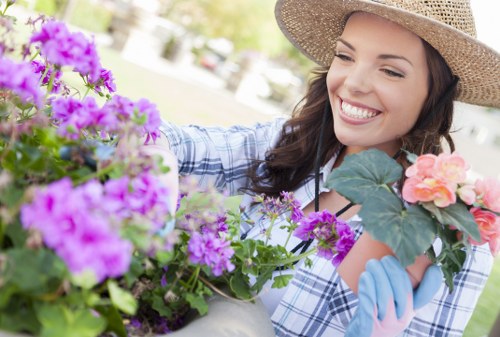
Welcome to the comprehensive guide on gardening in Colliers Wood. Whether you are a seasoned gardener or just starting, Colliers Wood offers a unique environment that can inspire your green thumb.
Colliers Wood, located in the heart of London, provides a blend of urban living and lush green spaces. This balance makes it an ideal place for gardeners looking to cultivate their passion amidst the city's hustle and bustle.
The local climate in Colliers Wood is conducive to a wide variety of plants. Understanding the specifics of this climate can help you choose the right plants and gardening techniques.
Climate and Soil Conditions
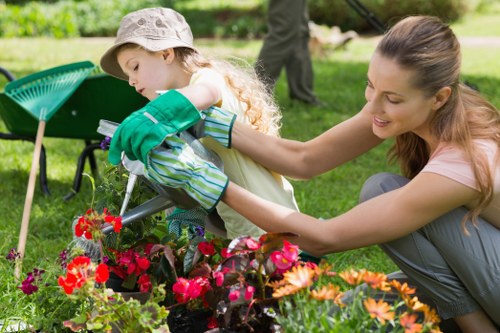
The climate in Colliers Wood is characterized by mild winters and warm summers, with moderate rainfall throughout the year. These conditions are favorable for many types of plants, from perennials to annuals.
The soil in Colliers Wood varies, but it generally consists of a mix of clay and loam. Testing your soil can help you determine its pH level and suitability for different plants.
Amending your soil with compost or other organic matter can improve its structure and fertility, providing a better environment for your plants to thrive.
Choosing the Right Plants
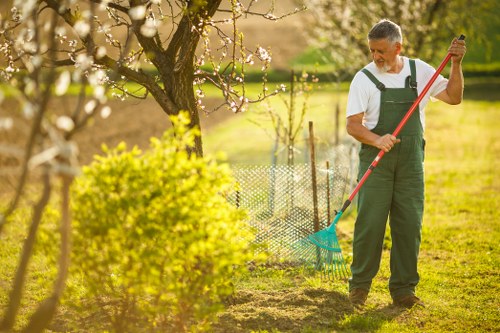
Selecting the right plants is crucial for successful gardening. In Colliers Wood, consider both the climate and your soil type when choosing plants.
Some popular choices include roses, lavender, and various herbs. These plants not only add beauty to your garden but also offer practical benefits, such as attracting pollinators and providing aromatic delights.
Native plants are particularly well-suited to the local environment and often require less maintenance, making them an excellent choice for busy gardeners.
Gardening Techniques
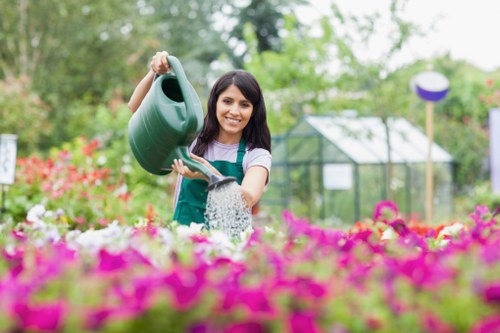
Adopting the right gardening techniques can significantly enhance your gardening experience. Techniques such as crop rotation, companion planting, and mulching can improve plant health and yield.
Watering efficiently is another important aspect. Using drip irrigation systems can conserve water and ensure your plants receive adequate hydration.
Regular pruning and deadheading can promote healthy growth and blooming, keeping your garden vibrant throughout the season.
Local Gardening Resources
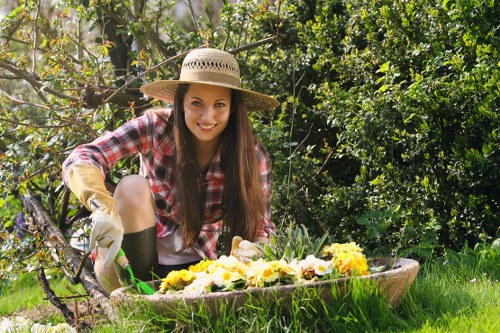
Colliers Wood boasts a variety of local gardening resources. From community gardens to nurseries, these resources provide support and inspiration for gardeners of all levels.
Joining local gardening clubs or attending workshops can help you connect with other gardening enthusiasts and learn new techniques.
Online resources and local libraries also offer a wealth of information on gardening practices tailored to the Colliers Wood area.
Seasonal Gardening Tips
Gardening is a year-round activity, but each season brings its own set of challenges and opportunities.
In spring, focus on planting new seedlings and preparing your garden beds. Summer requires vigilant watering and pest control, while autumn is ideal for harvesting and preparing your garden for winter.
Winter gardening can include planning for the next growing season, protecting plants from frost, and utilizing indoor gardening techniques.
10-15 Closest Areas to Colliers Wood
- Tulse Hill: Just a short distance from Colliers Wood, Tulse Hill offers beautifully maintained communal gardens perfect for gardening enthusiasts.
- West Dulwich: Known for its thriving garden centers and plant nurseries, West Dulwich is a prime spot for sourcing high-quality plants and gardening supplies.
- Clapham: Clapham’s expansive parks provide ample space for outdoor gardening workshops and community planting events.
- South Wimbledon: This area features several local markets where gardeners can find rare and unique plant varieties.
- Wandsworth: Wandsworth offers a mix of public and private green spaces, ideal for both amateur and professional gardeners.
- Tooting: Tooting is home to a vibrant gardening community with numerous clubs and societies dedicated to horticulture.
- Balham: Balham’s botanical gardens serve as an excellent resource for learning about different plant species and gardening techniques.
- Herne Hill: Herne Hill provides access to numerous gardening workshops and seminars throughout the year.
- Putney: Putney’s riverbanks offer unique gardening opportunities, including riparian plant cultivation.
- Streatham: Streatham features a variety of green spaces where gardeners can practice sustainable gardening methods.
- Earlsfield: Earlsfield has several garden centers specializing in organic gardening and eco-friendly practices.
- Gipsy Hill: Gipsy Hill is renowned for its rich soil, making it a favorite among local gardeners for growing vegetables and herbs.
- Stockwell: Stockwell’s community gardens are perfect for those looking to engage in urban gardening projects.
- West Norwood: West Norwood offers extensive gardening resources, including access to expert advice and local horticultural events.
- Norbury: Norbury’s greenhouses provide ideal conditions for growing exotic plants and experimenting with different gardening styles.
Maintaining Your Garden
Regular maintenance is key to a thriving garden. This includes weeding, watering, pruning, and monitoring for pests and diseases.
Implementing a maintenance schedule can help you stay on top of essential tasks, ensuring your garden remains healthy and vibrant throughout the year.
Using organic fertilizers and natural pest control methods can promote a sustainable garden that is both beautiful and eco-friendly.
Garden Design and Layout
A well-designed garden layout enhances both functionality and aesthetic appeal. Consider the placement of plants based on their sunlight and water needs.
Incorporating pathways, seating areas, and decorative elements can create a welcoming environment for relaxation and enjoyment.
Using raised beds and container gardening can maximize space, especially in urban settings with limited ground area.
Sustainable Gardening Practices
Sustainability in gardening focuses on practices that are environmentally friendly and resource-efficient.
Techniques such as composting, rainwater harvesting, and using native plants contribute to a sustainable garden that supports local ecosystems.
Reducing waste and minimizing the use of chemical fertilizers and pesticides are essential steps towards maintaining an eco-friendly garden.
Community and Gardening
Engaging with the local gardening community can provide support, inspiration, and valuable knowledge.
Participating in community garden projects fosters a sense of belonging and collective responsibility for maintaining green spaces.
Sharing resources and experiences with fellow gardeners can enhance your gardening practices and lead to more successful outcomes.
Gardening Tools and Equipment
- Basic Tools: Essential tools include a spade, hoe, rake, and pruners. These basics are necessary for most gardening tasks.
- Irrigation Systems: Installing drip irrigation or soaker hoses can help automate watering and ensure consistent moisture levels.
- Protective Gear: Gloves, a hat, and sturdy footwear protect you while you work in the garden.
- Soil Testing Kits: These kits help you monitor soil pH and nutrient levels, allowing you to make informed amendments.
- Composting Bins: Composting is a sustainable way to recycle garden waste and enrich your soil.
Advancements in Gardening Technology
Technology has revolutionized gardening, making it easier and more efficient. Smart irrigation systems, garden planning apps, and automated tools are just a few examples.
Using technology can help you monitor plant health, schedule maintenance tasks, and even control garden conditions remotely.
Staying updated with the latest gardening technologies can enhance your gardening experience and lead to better results.
Conclusion
Gardening in Colliers Wood offers a rewarding experience with its favorable climate, rich soil, and supportive community. By understanding the local conditions and utilizing the available resources, you can cultivate a beautiful and sustainable garden.
Whether you are planting flowers, growing vegetables, or creating a serene outdoor space, Colliers Wood provides the perfect backdrop for your gardening endeavors.
Embrace the joy of gardening and watch your efforts bloom into a thriving green oasis in the heart of the city.
Frequently Asked Questions
- What are the best plants for Colliers Wood's climate?
- Plants such as roses, lavender, herbs, and native species thrive well in Colliers Wood's mild climate.
- How can I improve my soil quality in Colliers Wood?
- Adding compost or organic matter can enhance soil structure and fertility. Regular soil testing is also recommended.
- Are there local gardening clubs in Colliers Wood?
- Yes, Colliers Wood has several gardening clubs and community gardens where enthusiasts can connect and share knowledge.
- What sustainable gardening practices are recommended?
- Composting, rainwater harvesting, using native plants, and minimizing chemical use are key sustainable practices.
- Where can I buy gardening supplies in Colliers Wood?
- Local nurseries and garden centers in nearby areas like West Dulwich and Tooting offer a wide range of gardening supplies.